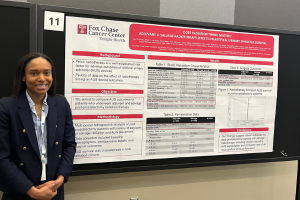

In a study presented at the American Urological Association (AUA) Annual Meeting 2024, researchers at Fox Chase Cancer Center showed that in men who have undergone surgery for prostate cancer, the function of artificial urinary sphincters for stress urinary incontinence was improved when radiation was used as an adjuvant therapy rather than as a salvage therapy.
Artificial urinary sphincters are devices implanted in some prostate cancer patients to supplement the function of a natural urinary sphincter, which restricts urine flow out of the bladder. Salvage therapy refers to any therapy administered after standard treatments have failed, while adjuvant therapy refers to a treatment given after the primary treatment to lower the risk of cancer returning.
“Although radiation history is recognized as a significant risk factor for adverse outcomes following artificial urinary sphincter implantation, the procedure remains the gold standard for male patients with stress urinary incontinence,” said Jay Simhan, MD, FACS, Vice Chair of the Department of Urology at Fox Chase. Simhan conducted the study with co-author Tyler Gaines, MD, an urology resident at Fox Chase.
“There is still little data, however, on the timing of radiation therapy in relation to outcomes after device implantation,” Simhan added.
To evaluate the importance of radiation timing in preserving artificial urinary sphincters, researchers performed a multicenter retrospective analysis that included 221 patients who underwent adjuvant or salvage radiation therapy and artificial urinary sphincter placement for stress urinary incontinence.

Tyler Gaines, MD
The study, which was the first multi-institutional series of its kind, demonstrated that an artificial urinary sphincter survives a shorter amount of time in salvage radiation prostate cancer survivors compared to those with a history of adjuvant radiation.
“The recent study underscores the critical importance of radiation therapy timing in the management of stress urinary incontinence for prostate cancer survivors. These findings highlight a crucial consideration for patient treatment planning and call for a nuanced approach in clinical decision-making to optimize outcomes and improve quality of life for affected individuals,” said Simhan.
“This acknowledgment highlights the collaborative effort of our team to push the boundaries of medical science. I am grateful for the opportunity to contribute to our understanding of treatment outcomes and remain dedicated to improving surgical care for prostate cancer survivors,” he added.
The results of the study, “Does Radiation Timing Matter? Adjuvant vs. Salvage Radiotherapy Effects on Artificial Urinary Sphincter Survival,” were presented by Gaines at the AUA meeting, which was held May 3-6 in San Antonio, Texas.


